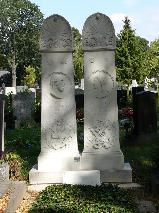Dingelstedt, Franz |
| DRAMATIST, POET, THEATRE DIRECTOR, JOURNALIST (GERMANY) |
|
BORN 30 Jun 1814, Halsdorf, Hessen - DIED 15 May 1881, Wien GRAVE LOCATION Wien: Zentralfriedhof, Simmeringer Hauptstraße 234, Simmering (Gruppe 05 A, Reihe 04, Nummer 80) |
|
Franz von Dingelstedt was the son of Friedrich Dingelstedt, the city treasurer of Rinteln in Hessen. He studied theology in Marburg between 1831 and in 1834 because his father wanted him to. During his studies he wrote songs and played in comedies and he decided to become a teacher instead of entering the church. He worked in Kassel, where he published his first poems. His dissertation "Prolegomena ad artem poeticam" was refused in Marburg nut accepted by the University of Jena. In 1841 he gave up teaching and he became the editor of the magazine Der Salon. In London he met the singer Jenny Lutzer and he married in her in 1844. In 1842 in Paris he met Heinrich Heine and Georg Herwegh. In 1843 he accepted work as a librarian for the king of Württemberg in Stuttgart and this was seen as a betrayal by fellow poets. In Stuttgart he also worked as a dramatist at the court theatre and in 1851 he went to Munich to become artistic director of the theatre. He was met with hostility there and in 1857 Franz Liszt helped him to obtain an engagement as general manager of the Court Theatre in Weimar. His cooperation with Liszt didn't go well because he gave drama priority above opera and Liszt finally resigned. In 1867 he became the director of the Court Opera in Vienna. He was ennobled by king Ludwig II of Bavaria in the same year. From 1870 he was the director of the Hofburgtheater and emperor Franz Joseph made him a baron in 1876. He died in Vienna in 1881. Family • Wife: Lutzer, Jenny (1844-1877) Related persons • has a connection with Liszt, Franz • quarreled with Milde-Agthe, Rosa von |
| Images |
Sources • Budig, Robert S. et al, Ehrengräber am Wiener Zentralfriedhof, Compress Verlag Wien, Wien • Prahacs, Margit, Franz Liszt, Briefe aus Ungarischen Sammlungen 1835-1886, Bärenreiter, Kassel, 1966 • Franz von Dingelstedt - Wikipedia (DE) |



